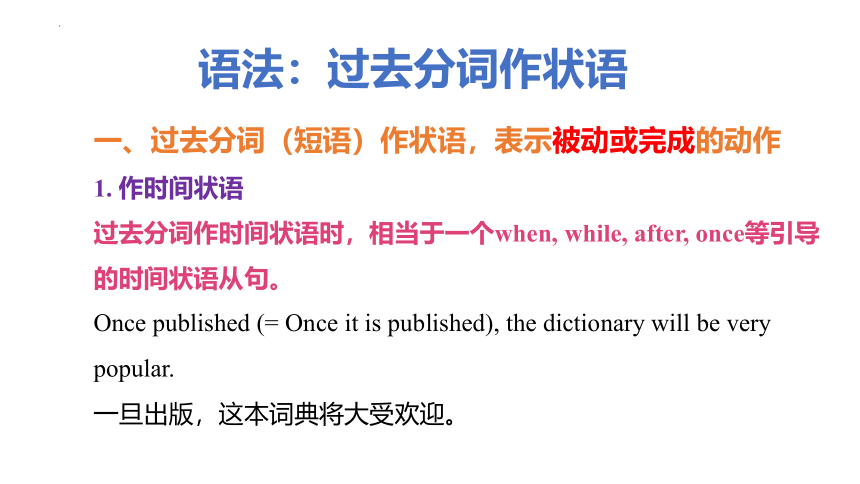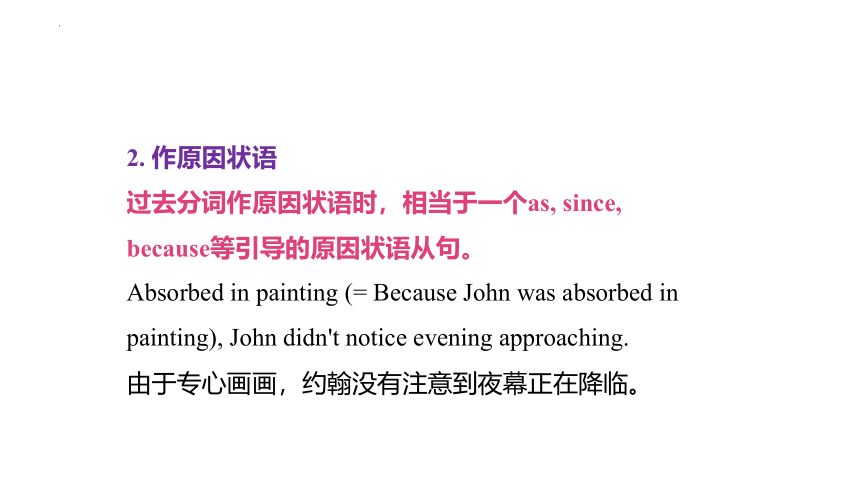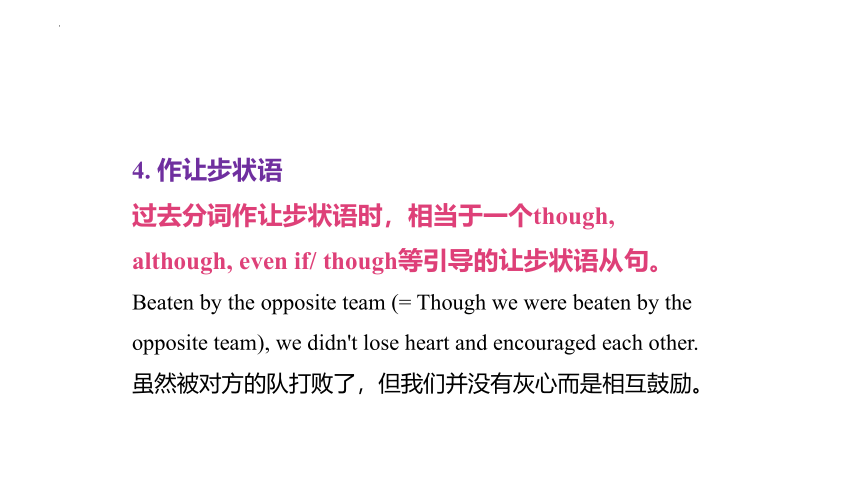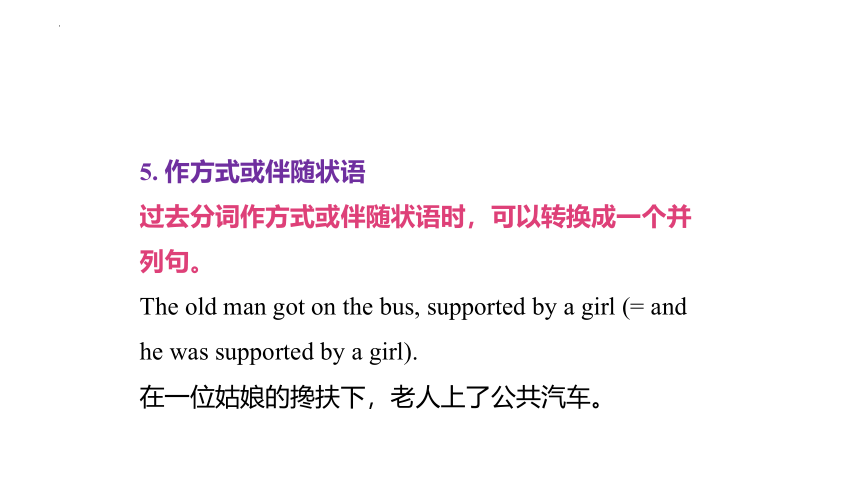北师大版(2019)选择性必修第三册Unit 7 Careers Lesson 1 EQ: IQ语法过去分词课件(共11张PPT)
文档属性
| 名称 | 北师大版(2019)选择性必修第三册Unit 7 Careers Lesson 1 EQ: IQ语法过去分词课件(共11张PPT) |

|
|
| 格式 | pptx | ||
| 文件大小 | 65.0KB | ||
| 资源类型 | 教案 | ||
| 版本资源 | 北师大版(2019) | ||
| 科目 | 英语 | ||
| 更新时间 | 2022-12-01 16:27:58 | ||
图片预览





文档简介
(共11张PPT)
一、过去分词(短语)作状语,表示被动或完成的动作
1. 作时间状语
过去分词作时间状语时,相当于一个when, while, after, once等引导的时间状语从句。
Once published (= Once it is published), the dictionary will be very popular.
一旦出版,这本词典将大受欢迎。
语法:过去分词作状语
2. 作原因状语
过去分词作原因状语时,相当于一个as, since, because等引导的原因状语从句。
Absorbed in painting (= Because John was absorbed in painting), John didn't notice evening approaching.
由于专心画画,约翰没有注意到夜幕正在降临。
3. 作条件状语
过去分词作条件状语时,相当于一个if, unless等引导的条件状语从句。
Given another hour (= If I am given another hour), I can also work out this problem.
如果再给我一个小时,我也能把这道题算出来。
4. 作让步状语
过去分词作让步状语时,相当于一个though, although, even if/ though等引导的让步状语从句。
Beaten by the opposite team (= Though we were beaten by the opposite team), we didn't lose heart and encouraged each other.
虽然被对方的队打败了,但我们并没有灰心而是相互鼓励。
5. 作方式或伴随状语
过去分词作方式或伴随状语时,可以转换成一个并列句。
The old man got on the bus, supported by a girl (= and he was supported by a girl).
在一位姑娘的搀扶下,老人上了公共汽车。
1. 过去分词作状语时,其前面可以带有相应的连词,如when, though, although, as if, as though, if, unless, until, once等,表时间、让步、条件、方式等。
If (I am) invited, I will attend the wedding of my friend.
如果受到邀请,我会参加我朋友的婚礼。
二、过去分词作状语的注意事项
2. 过去分词作状语时,其逻辑主语必须与句子的主语保持一致(现在分词作状语同样如此),否则需加上自己的主语,构成独立主格结构。
Given a chance, we can surprise the world.
若给我们一个机会,我们会使世界惊奇。
He was listening attentively in class, his eyes fixed on the blackboard. 他上课专心听讲,眼睛紧盯着黑板。
3. 有些过去分词已形容词化,作状语时表示人的状态。常见的有:satisfied, surprised, interested, moved, worried, pleased, disappointed等。
Disappointed at the examination results, the girl stood there without saying a word.
因为对考试结果很失望,小女孩站在那儿一句话也没说。
三、过去分词与现在分词作状语的区别
项目 逻辑关系 时间概念
过去分词作状语 过去分词作状语时,过去分词所表示的动作与句子的主语之间是逻辑上的动宾关系,即表被动 过去分词所表示的动作往往发生于谓语动词所表示的动作之前,或表示一种状态,与谓语动词所表示的动作同时发生或存在
现在分词作状语 现在分词的一般式(doing)和完成式(having done)作状语时,现在分词所表示的动作与句子的主语之间是逻辑上的主谓关系,即表主动 现在分词的一般式(doing)表示的动作与谓语动词所表示的动作同时发生或几乎同时发生;现在分词的完成式(having done)表示的动作发生在谓语动词所表示的动作之前
练习
1. Clearly and thoughtfully _________ (write), the book inspires confidence in students who wish to seek their own answers.
2. _________ (found) in the early 20th century, the school keeps on inspiring children's love of art.
written
Founded
练习
3. Video games can be a poor influence if __________ (leave) in the wrong hands.
4. Children, when ______________ (accompany) by their parents, are allowed to enter the stadium.
5. The lecture _____________________ (give), a lively question-and-answer session followed.
left
accompanied
having been given
一、过去分词(短语)作状语,表示被动或完成的动作
1. 作时间状语
过去分词作时间状语时,相当于一个when, while, after, once等引导的时间状语从句。
Once published (= Once it is published), the dictionary will be very popular.
一旦出版,这本词典将大受欢迎。
语法:过去分词作状语
2. 作原因状语
过去分词作原因状语时,相当于一个as, since, because等引导的原因状语从句。
Absorbed in painting (= Because John was absorbed in painting), John didn't notice evening approaching.
由于专心画画,约翰没有注意到夜幕正在降临。
3. 作条件状语
过去分词作条件状语时,相当于一个if, unless等引导的条件状语从句。
Given another hour (= If I am given another hour), I can also work out this problem.
如果再给我一个小时,我也能把这道题算出来。
4. 作让步状语
过去分词作让步状语时,相当于一个though, although, even if/ though等引导的让步状语从句。
Beaten by the opposite team (= Though we were beaten by the opposite team), we didn't lose heart and encouraged each other.
虽然被对方的队打败了,但我们并没有灰心而是相互鼓励。
5. 作方式或伴随状语
过去分词作方式或伴随状语时,可以转换成一个并列句。
The old man got on the bus, supported by a girl (= and he was supported by a girl).
在一位姑娘的搀扶下,老人上了公共汽车。
1. 过去分词作状语时,其前面可以带有相应的连词,如when, though, although, as if, as though, if, unless, until, once等,表时间、让步、条件、方式等。
If (I am) invited, I will attend the wedding of my friend.
如果受到邀请,我会参加我朋友的婚礼。
二、过去分词作状语的注意事项
2. 过去分词作状语时,其逻辑主语必须与句子的主语保持一致(现在分词作状语同样如此),否则需加上自己的主语,构成独立主格结构。
Given a chance, we can surprise the world.
若给我们一个机会,我们会使世界惊奇。
He was listening attentively in class, his eyes fixed on the blackboard. 他上课专心听讲,眼睛紧盯着黑板。
3. 有些过去分词已形容词化,作状语时表示人的状态。常见的有:satisfied, surprised, interested, moved, worried, pleased, disappointed等。
Disappointed at the examination results, the girl stood there without saying a word.
因为对考试结果很失望,小女孩站在那儿一句话也没说。
三、过去分词与现在分词作状语的区别
项目 逻辑关系 时间概念
过去分词作状语 过去分词作状语时,过去分词所表示的动作与句子的主语之间是逻辑上的动宾关系,即表被动 过去分词所表示的动作往往发生于谓语动词所表示的动作之前,或表示一种状态,与谓语动词所表示的动作同时发生或存在
现在分词作状语 现在分词的一般式(doing)和完成式(having done)作状语时,现在分词所表示的动作与句子的主语之间是逻辑上的主谓关系,即表主动 现在分词的一般式(doing)表示的动作与谓语动词所表示的动作同时发生或几乎同时发生;现在分词的完成式(having done)表示的动作发生在谓语动词所表示的动作之前
练习
1. Clearly and thoughtfully _________ (write), the book inspires confidence in students who wish to seek their own answers.
2. _________ (found) in the early 20th century, the school keeps on inspiring children's love of art.
written
Founded
练习
3. Video games can be a poor influence if __________ (leave) in the wrong hands.
4. Children, when ______________ (accompany) by their parents, are allowed to enter the stadium.
5. The lecture _____________________ (give), a lively question-and-answer session followed.
left
accompanied
having been given
